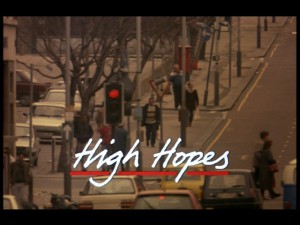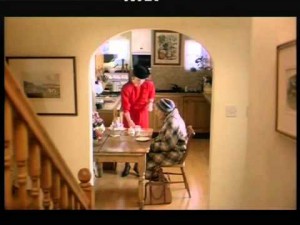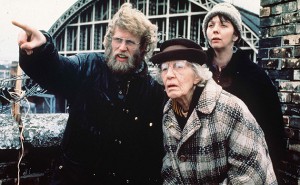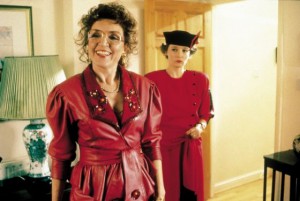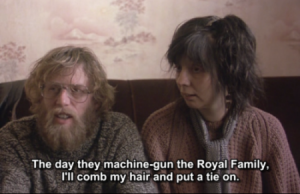From the Chicago Reader (April 21, 1988). — J.R.
HIGH HOPES
*** (A must-see)
Directed and written by Mike Leigh
With Philip Davis, Ruth Sheen, Edna Dore, Philip Jackson, Heather Tobias, Leslie Manville, David Bamber, Jason Watkins, and Judith Scott.
One of the most interesting things about Mike Leigh’s up-to-the-minute bulletin from Thatcher England is its title. Because this wonderful English movie is partly a comedy, and because it’s very much about the way that Londoners live nowadays, one would assume a title like High Hopes is ironic. Among most of my English friends, the expectations currently expressed about their country’s future couldn’t be much lower; and at first glance, there’s nothing in this movie to contradict their pessimism.
But take a second look at Leigh’s movie — which is sharp and funny and broad enough to warrant it — and you might find some reason for revising this opinion. England is after all a country of survivors, and one of the best ways of surviving in extreme situations (say, the London blitz) is to assume the worst and start from there. That’s what the leading characters and heroes of High Hopes do, a very charismatic, funky post-hippie couple named Cyril (Philip Davis) and Shirley (Ruth Sheen). (They like to smoke hash, which lends another possible nuance to the “high” in the title and thus another kind of ambiguity.) And ironically but unmistakably, the very fact of their survival in the late 80s is cause for some hope, high or otherwise.
Another cause for hope, qualified but genuine, is the fact that films about the horrors of Thatcherism, like High Hopes, last year’s Sammy and Rosie Get Laid, and the forthcoming For Queen and Country, are actually being made, distributed, and seen. What kind of equivalents are there about the horrors of Reaganism? At best we get semimetaphorical statements like Walker, They Live, and Parents –– not movies to be sniffed at, but not really investigations of the actual texture of our lives, either. That all three movies have to resort to fantasy and/or history in order to comment on the present is grimly significant; it’s almost as if we will have to experience some sort of Yankee glasnost before we can deal with such matters straight in our movies, without the sugar frosting and concealment provided by gloss and genre. (At least we had the benefit of Albert Brooks’s Lost in America a few years back.) People who see dream bubbles like Rain Man or Mississippi Burning as “realistic” only demonstrate that, unlike the English, we no longer have a realist tradition — assuming that we ever had one in the first place.
It may be that the sizes of our respective countries have something to do with this apparent difference. Metaphorically speaking, America is an elephant surrounded by blind men, each of whom has a different idea of it according to whether he’s fingering the trunk, the tail, or one of the feet. Class divisions in England lead to a smaller version of the same problem, as even High Hopes demonstrates; but at least it’s possible to grasp the whole animal in some form, even if the individual’s perspective is invariably a bit skewed.
Well known in England but a virtual stranger in the United States, Leigh has only one previous movie to his credit, Bleak Moments (1971), but he’s written and directed 18 plays for the theater and over a dozen TV plays (all but one for the BBC). Working improvisationally with his actors, who create their own characters and stories with his help, Leigh is as steeped in the texture of English life as any other contemporary who comes to mind, but whether it follows that his other work is unexportable is difficult to say. The American viewer of High Hopes may have occasional problems in following the dialogue, but the characters register loud and clear, and no viewer is likely to be bored for even an instant.
High Hopes doesn’t have a lot of plot, but it has people to spare, spread out neatly over three classes and given three levels of stylization. Cyril works as a motorbike messenger and Shirley is a council garden worker; their political friend Suzi (Judith Scott) seems equally working-class and disenfranchised. Cyril’s forgetful widowed mother, Mrs. Bender (Edna Dore), who also lives in King’s Cross, and is on the brink of Alzheimer’s disease, is the last council tenant on an otherwise gentrified street. Wayne (Jason Watkins), a provincial innocent who is briefly taken in and coddled by Cyril and Shirley when he has nowhere else to go, appears to be equally strapped for cash. Wayne’s helplessness may be a bit exaggerated (he doesn’t even know what “cabbie” means), but the other four characters are as real as any in recent movies.
On the next step up the ladder are Cyril’s sister Valerie (Heather Tobias) and her adulterous husband Martin (Philip Jackson), a used-car salesman. They are clearly middle-class vulgarians and just as clearly objects for satire, although they’re still treated with a certain amount of understanding. Mrs. Bender’s next-door neighbors, wine merchant Rupert (David Bamber) and his wife Laetitia (Leslie Manville), are unabashed yuppies, and comic-book cutouts to boot.
Although Leigh is a bit hard at times on Wayne and Suzi — and so are Cyril and Shirley, his soul mates — there’s no doubt that his impulse toward caricature increases substantially as he moves up the economic ladder. Martin and Valerie are sad and pathetic, but Rupert and Laetitia, as their names alone will tell you, are positively and irredeemably loathsome. Several critics have objected to this sliding scale for realistic treatment, but given where the film’s heart and soul reside, it is perfectly logical for Leigh to treat these characters differently, according them different degrees of realism; after all, Thatcher’s England does more or less the same thing, only in reverse.
What are the characters’ expectations and the moral attitudes that direct them? Rupert declares at one point: “What makes this country great is a place for everyone and everyone in his place.” He adds pettishly, of his own gentrified house, that “this is my place.” This declaration is provoked by Mrs. Bender, who having forgotten both her purse and her keys on a trip to the pharmacist has been forced to depend on the reluctant hospitality of Rupert’s wife. Eager to get this confused elderly woman off her hands, Laetitia phones Mrs. Bender’s daughter. Valerie, whose sensitivity toward her mother has been already demonstrated by the belated Christmas gift of a blood-pressure machine, now summons her brother Cyril to take charge, so that she’ll have more time to poke around the yuppie house and check out the furnishings. By the time Cyril arrives, after Martin has mistakenly informed him that his mother has suffered a serious accident, Rupert and Laetitia are in a rush to get to the opera, and the attitudes of all three classes converge in a momentary collision.
Martin’s double-edged credo is that every man has his price and should start his own business, and Laetitia’s appears to be that every piece of property has its price and should be resold for profit. But Cyril’s attitude is simply: “I want everyone to be able to eat.” On the other hand, he’s not at all certain about what to do about it. Visiting Karl Marx’s grave in Highgate cemetery with Shirley, he reads the inscription — “The philosophers have only interpreted the world in various ways. The point is to change it” — and remarks, “The thing is, change what? It’s a different world now.” This is a point that’s made all the more telling when a group of Chinese tourists turns up at the grave site; it is also dramatized by Cyril and Shirley’s political discussion with their radical friend Suzi.
Many non-English critics, myself included, have long harbored a belief that formal and structural inventiveness and English realism are somehow incompatible; but assuming that this was ever the case, recent films like High Hopes and Terence Davies’s forthcoming Distant Voices, Still Lives decisively make this assumption seem antiquated and false. Despite the seemingly loose, episodic structure of High Hopes, Leigh proceeds through a system of parallels, between characters and between scenes, that couldn’t be more pointedly and creatively organized. The sexual habits and predilections of the three main couples are delightfully juxtaposed, and woven throughout the film are the parallel treatments of two wholly separate and unconnected characters, Wayne and Mrs. Bender, the two lost souls who need Cyril and Shirley’s succor.
Indeed, there are many moments in the film when the form virtually produces the content. The plot culminates in a disastrous birthday party for Mrs. Bender at Valerie’s house, when Valerie’s insistence that her mother eat some of the birthday cake sets off an extended row with her brother; the others eventually join in. Leigh’s brilliant strategy for filming this event is to keep his camera fixed throughout the argument on Mrs. Bender, in close-up, staring off into space with a depressed expression. The shot is held for such a long time that the indescribable sadness and remoteness of the mother’s face eventually overtake everything that is being said, including Cyril’s relatively sympathetic remarks. No matter how much the film may side with the viewpoint of Cyril and Shirley, there are times when even their insights become secondary to the overall picture.
Shirley, who keeps a cactus plant that she calls Thatcher “because it’s a pain in the ass when you go out the door,” wants to have a kid, but Cyril has his doubts: “They’re out of date, families. They’re no use anymore. Two’s company, you know what I mean?” It’s part of the strength of this movie that such issues are never allowed precedence over the characters who express them and the lives that they lead. Wistfully, perhaps hopelessly, the film places whatever optimism it has in the private sector. Certainly there is no hope in Thatcher’s machinations (“She’s already crippled the welfare state,” Suzi remarks, “and now she’s going to kill it off”), but to place it solely in the realm of personal decency is not a completely happy solution, even though Cyril and Shirley make it seem more viable than any other.
Leigh clearly loves this couple as much as we do — it’s hard to think of a more lovable couple in any 80s movie — but it’s part of the strength and solidity of this film that he doesn’t idealize them or gloss over their weaknesses. Like the late John Cassavetes, whose directorial vision has certain parallels with his own, Leigh displays a passionate affection for and commitment to his leading characters that never precludes a critical distance.

